The United Kingdom will likely get a new prime minister after the country’s July 4 elections. No one will cast a ballot for that position.
France has a system of true Gallic complexity, but the effect is the same. In its two rounds of elections that start next week, voters will never be asked which person should be their nation’s principal leader.
Canadians will do much the same next year. Ditto for the recently concluded Indian elections. That’s how it works in Germany, too.
There are lots of things that make America different from most of the world, exceptional, even. But one of them is that in our Madisonian system of divided powers, we choose our chief executive and legislature separately. The design is intended to create competing centers of authority with different constituencies. Only the president is elected by the whole nation, while the Congress is chosen locally and by the states.
Once chosen, the members of the House and Senate gather into their party factions, go behind closed doors and hash out which individuals will lead their teams. In most democracies, national leaders are chosen in the same way we got House Speaker Mike Johnson and Senate Majority Leader Chuck Schumer: The people pick the party in power, and the party picks its leader.
Mexico, Argentina, Chile and some other nations that modeled their governments on an American-style system have versions of direct elections for their principal executives, but these are the exceptions worldwide. Even in the United States, we filter the choice through the Electoral College, which is designed to temper majoritarianism by encouraging geographic and regional consensus, and not just popular sentiment.
But America isn’t just more democratic than most other nations in our preference for very nearly direct elections for our chief executive, we have, for the past 50 or so years, embraced direct democracy for choosing the candidates the parties put forward in the first place. American voters don’t just get to choose who will be both head of state and the leader of the government, since the 1970s, voters here get to pick who will be allowed to compete for the big job.
There are a lot of things that make America unique that are wonderful. When the rest of the world decided to report the weather in degrees Celsius, our country decided to stick with a Farenheit system in which 100 is very hot and zero is very cold as opposed to one in which 100 is hotter than any temperature ever recorded in nature and zero is just kinda chilly. Iced drinks, smiles for strangers, free speech, the McRib—there are lots of unusual things that make America great.
Would that we could say primary elections were one of them.
In The Federalist Papers, No. 10, James Madison argues that political factions are an unavoidable byproduct of freedom. If people are free to speak, free to associate, and free to align themselves as they choose, they will inevitably choose sides against each other. “Liberty is to faction what air is to fire.”
Liberty being indispensable, he argued that for “curing the mischiefs of faction” it was better to control its effects than remove its causes. The first, most important part of that work was achieved in the framework of our constitutional republic itself: dividing power, guaranteeing rights, protecting the voices of minorities, etc.
But the second, nearly as important part happens in the factions themselves. Democracy has traditionally taken place between the parties, not within them. Ward-heeling, patronage, party bosses, and smoke-filled rooms are not pretty to think of, but they worked well at tempering the passions of the electorate. When parties functioned like other private institutions, such as corporations, labor unions, and civic groups, they were not very democratic, but their leaders tended to be deeply invested in the promulgation, stability, and success of the institutions themselves.
Now, we have weak parties in which the only real bosses are the voters. Starting with the backlash against party bossing in the 1968 Democratic nomination, intensifying with the post-Watergate push for transparency and democracy in the 1970s, and culminating with the crackdown on party fundraising in the 1990s, America took a boldly progressive direction on partisanship: More direct democracy, tighter regulation, and strict anti-corruption measures.
The results have been, frankly, abysmal.
Since America is so much more democratic than most of our Western counterparts, the parties themselves had come to play a more significant role in interposing themselves between the momentary passions of the people and the practical application of governmental authority. Rather than leaving the choice of our ultimate leaders to elected legislators behind closed doors, we formerly put that role in the hands of party bosses, chosen by their fellow partisans, at the start of the process.
Now, we have two rounds of direct elections, and little to temper anyone’s passions—and the fire of partisanship has been burning out of control for some time. We see it in a Congress paralyzed by fear of primary voters and obsessed with “messaging” legislation aimed mostly at soothing or stoking anger rather than accomplishing any policy objectives.
For a long time, the residual power of the parties and the cost and complexity of running for presidency kept the worst effects of passionate partisan nincompoopery from wrecking the selection of our chief magistrates. But technological advancements overtook us. Direct democracy was coupled with direct communications and direct fundraising in such a way that whatever vestigial elements of the old system remained could no longer hold back the tide.
If you’re reading this, there’s a decent chance that you agree with the arguments against partisan primaries as a means for choosing candidates. But certainly you are familiar with them. In the world of politics, we have been chewing on the gristle of the matter of party dysfunction for much of this century.
But imagine you weren’t one who was interested in the history of intra-party wangling. What if you never thought about the implications of the McCain-Feingold Act and the Citizens United decision, like, ever? What if you thought about parties and politics as necessary evils that demanded your attention in even-numbered years but were otherwise to be mostly avoided? Which is to say, what if you were a normal person?
How would you receive the fact that our major parties have coughed up for this presidential election two candidates whom most people wouldn’t let operate a banana stand unattended? When Republicans offer a convicted felon who tried to steal a second term and Democrats offer an obviously infirm 81-year-old, even casual political observers understand that something is seriously wrong with our system.
Partisans in both parties will struggle to make any compelling cases for their candidates, and tens of millions of rank-and-file voters will simply shrug, remind themselves that the other side is probably worse and stick with their home team. But these nominees do offer an opportunity for positive persuasion … for a better system to select their successors.
I’d prefer that parties return to a local-to-regional-to-state-to-national system of conventions and delegates, but maybe you like something else: ranked-choice primaries, top-two universal primaries, etc. Whatever you like, the next time someone bemoans the fact that in a nation of 333 million souls, we are left with these two dudes, don’t just nod in agreement. Instead, tell them—quickly and plainly—why it is that way and why you’re looking for reform.
Something good should come out of this demolition derby of democracy, so let it be a moment for Americans to get serious about fixing our parties. If we don’t take the right lesson from 2024, what we get next time is unlikely to be any better.







Please note that we at The Dispatch hold ourselves, our work, and our commenters to a higher standard than other places on the internet. We welcome comments that foster genuine debate or discussion—including comments critical of us or our work—but responses that include ad hominem attacks on fellow Dispatch members or are intended to stoke fear and anger may be moderated.
With your membership, you only have the ability to comment on The Morning Dispatch articles. Consider upgrading to join the conversation everywhere.